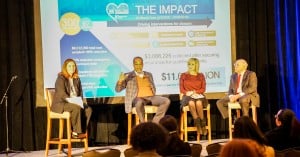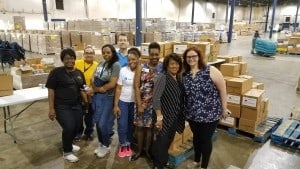ONE Health, Regional One Health’s complex care program, had a successful year in 2019.
The program, which helps patients with complex medical and social needs, continues to gain national recognition for decreasing the cost of care, emergency department visits and inpatient stays for enrolled patients.
In 2020, ONE Health leaders look forward to increasing the number of patients they can serve and building new partnerships to meet additional needs.
Patients in Regional One Health’s ONE Health complex care program start from the ground up to build healthy, productive lives by accessing medical care, addressing social needs and building authentic relationships.
Their journey mirrors the trajectory of the program itself.
Since starting in April 2018, ONE Health has grown from a brand new concept to a nationally-recognized model for complex care. After a successful 2019, the New Year will see it expanding to serve more patients and add new community partners.
Susan Cooper, Regional One Health senior vice president and chief integration officer, said ONE Health has had a remarkable impact on enrolled patients and the health care system as a whole. “Data shows the effectiveness of the program as we continue to see a decrease in the total cost of care, emergency department visits and inpatient admissions,” she said.
ONE Health enrolls patients who have frequent emergency department visits and inpatient stays due to fragmented medical care and unmet social needs. Regional One Health’s internal medicine clinic and inpatient pharmacy help provide regular medical care, and social workers address needs like housing, job placement and more.
As of the end of 2019, ONE Health had enrolled 346 patients and graduated 116, meaning they achieved stability in terms of health and social needs. The team also obtained insurance coverage for 94 of the enrolled patients, all of whom are uninsured when they start the program.

Regional One Health co-hosted the National Center for Complex Health and Social Needs’ annual conference last November, bringing over 800 experts in the field of complex care to Memphis to discuss how to move the field forward.
While the numbers are remarkable, they aren’t the only big news for ONE Health in 2019.
Last November, Regional One Health co-hosted the National Center for Complex Health and Social Needs’ annual conference, bringing 800 researchers, academics and people with lived experience to Memphis to discuss complex care. The event served as an opportunity to advance the field and as recognition of ONE Health’s national leadership on the issue.
Additional recognition came in the form of numerous presentations, a Gage Award from America’s Essential Hospitals, a Champion Award from the Memphis/Shelby County Homeless Consortium, and articles in Health Affairs and Campaign for Action.
ONE Health also enjoyed growing financial support. After starting with a three-year grant from The Assisi Foundation, in 2019 ONE Health added a $750,000 three-year commitment from The Plough Foundation and gifts from United Health Care, AutoZone, Qsource and Goldman Sachs.
The new funding has allowed ONE Health to increase the number of care teams, going to three in 2019 with plans for a fourth in 2020. “This will help us increase the number of people we are able to interact with and open up an opportunity to extend the hours during which someone is onsite to assist patients,” Cooper said.
Grant money is also used to supplement wraparound services, such as a partnership with the Metropolitan Inter-Faith Association to provide home delivery of medically-tailored meals to enrolled patients starting early this year.
The MIFA collaboration is just one example of how another key component of ONE Health – community partnerships – also thrived in 2019.

ONE Health added a food pantry to its services last year. They’ve been able to supply over 1,900 meals to over 1,300 individuals.
While Regional One Health does a great job providing medical services, Cooper said, the health care system recognizes it is not the expert in areas like housing, employment, transportation, etc. For that, ONE Health relies on partnerships.
Last year, a transportation pilot program provided over 1,200 rides to medical, behavioral health and social service appointments. A food pantry distributed almost 19,000 meals to over 1,300 individuals. The Cash Saver grocery store fulfilled hundreds of vouchers for fresh produce.
Meanwhile, Quality Reimbursement Services helps eligible patients obtain Social Security disability benefits, Alliance Healthcare Services provides mental health care and the Community Alliance for the Homeless Memphis helps find housing for qualified patients.
ONE Health has a bright future as it approaches the two-year mark, and Cooper and her team look forward to continuing to make Memphians – and the community as a whole – healthier.
“We are building authentic, meaningful partnerships and embracing new partnerships for the future development of this program and the improved health of our patients,” Cooper said. “We firmly believe every Memphian deserves great health, and that to improve the health of this community, we have to take care of our most vulnerable.”

